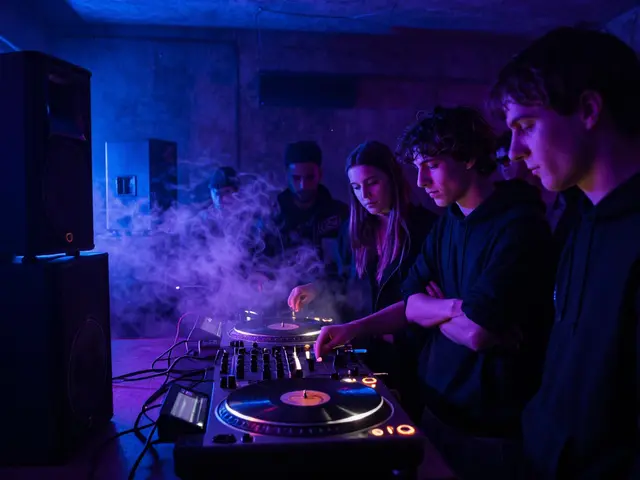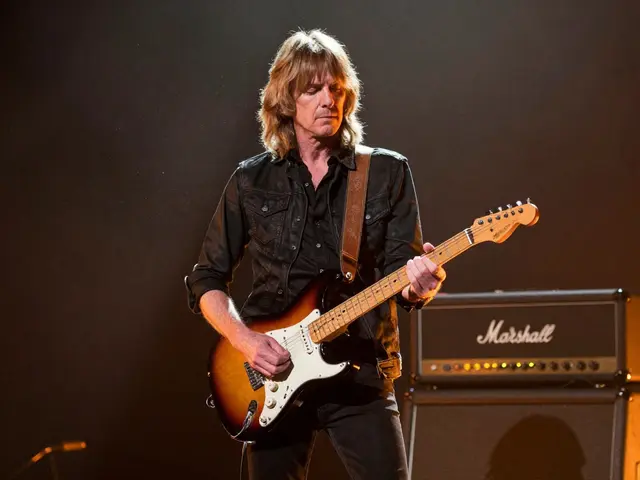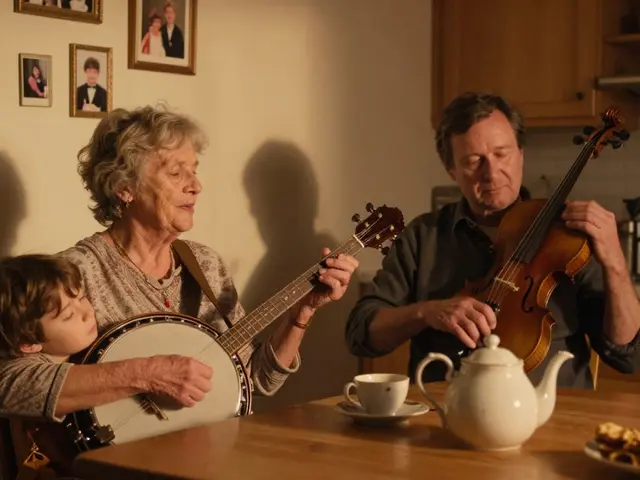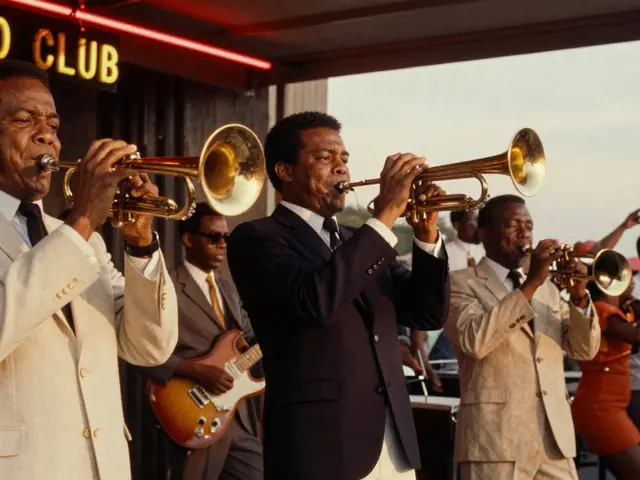Music possesses a magical quality that resonates deep within our souls, touching on emotions and thoughts that words often fail to convey. Playing a musical instrument provides not just an opportunity to produce sound, but a chance to wield a new language of creativity.
Whether you're picking up a guitar for the first time or refining skills on a well-loved piano, the journey of crafting music stimulates the mind in extraordinary ways. This is not just anecdotal; numerous studies have shown that engaging with music can enhance memory, boost coordination, and even fortify problem-solving skills.
Beyond the cognitive benefits, musical instruments also serve as expressive outlets. They allow us to channel emotions that range from exuberance to melancholy, offering an artistic release that can bring both comfort and challenge.
Exploring the world of musical instruments can be one of the most rewarding paths for those striving to nurture their creative instincts. With a plethora of possibilities, choosing the right one can set the stage for a lifetime enriched by music's boundless possibilities.
- The Inspirational Power of Music
- Cognitive Benefits of Playing Instruments
- Choosing the Right Instrument for Creative Growth
- Music and Emotional Expression
- Practical Tips to Begin Your Musical Journey
The Inspirational Power of Music
Music, in its many forms and expressions, holds a power that is nothing short of inspirational. It's more than just notes and rhythms arranged artfully on a page—it's a universal language that cuts across cultures and unites disparate groups of people in harmony. From the exhilarating crescendos of a symphony to the introspective strumming of an acoustic guitar, music stirs something within us that few other art forms can match. There is an innate connection between music and human emotion; a haunting melody or a joyous tune can evoke memories long forgotten or emotions buried deep within.
Perhaps one reason for music's inherent inspiration is its ability to mirror human experiences so vividly. When you pick up a musical instrument, you're not just playing a piece—you're telling a story, speaking without words. The same tune may feel joyous to one person, while bringing another to tears, demonstrating music's unique ability to resonate personally with each listener. As Friedrich Nietzsche once said,
"Without music, life would be a mistake."This sentiment reflects music's essential role in the tapestry of life, enhancing our experiences and enriching our spiritual journeys.
The Emotional Language of Music
Music provides an emotional outlet like few other mediums. It expresses the inexpressible, and in doing so, it becomes a friend in times of solitude. Many have found solace in playing an instrument during life's tumultuous storms, funneling chaotic emotions into orderly melodies. Studies have shown that creativity flourishes in the midst of music's embrace, as the patterns and structures challenge the mind to see connections and possibilities where there seemed to be none. In this way, music doesn't just inspire; it empowers. By tapping into this well of creativity, individuals can find new ways to express themselves, often gaining personal insights and a deeper understanding of their own emotions along the way.
The sheer diversity of musical instruments only expands the canvas. Each instrument offers its own voice and its own method of storytelling. A violin's mournful wail can communicate sorrow, while the bright pluck of a ukulele might tell of sunlight and laughter. Whether one is drawn to the traditional grandeur of a piano or the digital frontier of electronic music, there's an instrument ready to complement any creative vision. Through practicing and mastering these tools, musicians can share their inner worlds with an audience, big or small, often inspiring others to embark on their own artistic endeavors.
Music as a Catalyst for Cultural Innovation
Beyond individual creativity, music has played a pivotal role as a catalyst for cultural innovation throughout history. Consider how jazz, born from the African American communities, revolutionized the 20th century music scene, influencing genres from rock and roll to hip-hop. Each new style or genre that evolves carries forward a thread of its musical lineage while adding new elements, thus creating an ever-expanding repertoire for artists to draw inspiration from. The world's rich tapestry of musical traditions ensures that there is always something new to learn, to experience, and to inspire. Whether through formal instruction or spontaneous jam sessions, music encourages people to explore unfamiliar sounds and ideas, laying down a foundation for both personal and collective growth.
Cognitive Benefits of Playing Instruments
Playing musical instruments often seems like a leisure activity or a form of creative expression, yet it also holds significant cognitive advantages that many might not readily associate with music. Engaging with musical instruments activates multiple areas of the brain simultaneously. This comprehensive mental workout translates to enhanced cognitive functions. Studies indicate that those who learn to play instruments experience an improvement in memory retention and recall. For example, when musicians memorize complex scores or compositions, they are not just training their musical skills but also enhancing their ability to remember details in various life aspects. This memory gain is attributed to the way learning music structurally organizes brain information, creating robust neural pathways that improve the overall capacity for memory throughout one's life.
One intriguing advantage of indulging in musical pursuits is the noticeable improvement in attention span and focus. Playing an instrument demands intense concentration, as both hands often need to coordinate intricately while following musical notation that tests one's ability to multitask. This capability to sustain focus spills over into other areas of life, setting musicians apart in activities that require prolonged attention. Moreover, research suggests that music learners also demonstrate enhanced spatial-temporal skills, which are critical in solving complex mathematical problems and understanding intricate designs. They engage in what cognitive scientists term as 'conceptual blending', combining various streams of sensory input to create a holistic understanding of their actions.
Engaging with musical instruments frequently uplifts mood and reduces stress levels, leading to better emotional health, which indirectly boosts cognitive abilities. The act of creating music releases dopamine, often called the ‘feel-good’ neurotransmitter, in the brain, helping individuals maintain a positive outlook. This optimism can significantly enhance their learning efficiency and the ability to process information quickly. In an insightful quote, Dr. Anita Collins, a leading researcher on music's effect on the brain, stated,
"Learning music can bring a profound change to the brain's structure, showing that playing an instrument is essentially a full-body brain workout that refines the intricate inner-workings of our minds."
The creativity sparked by engaging with instruments can translate to advanced problem-solving skills. A musician constantly needs to improvise, adapt, and find new solutions for playing pieces, crafting novel compositions, or even perfecting a tune. This regular engagement with innovative thinking and pattern recognition prepares the brain to approach problems more effectively in other fields. Thus, the advantages of learning music are not confined to artistic circles but ripple through into one's academic and professional endeavors.
Incorporating practice with musical instruments into regular routines can even influence important life skills such as patience and perseverance. Progressing in music requires dedication and frequent practice, yet it teaches individuals to overcome frustrations and build patience. This dedication kindles an intrinsic sense of discipline that players can apply in diverse contexts, from educational pursuits to career challenges. It's noteworthy how music naturally lends itself as a tool for building character, honing intellect, and enriching personality, making the investment in learning truly invaluable.

Choosing the Right Instrument for Creative Growth
When considering which musical instrument to embrace on your journey of creative growth, it's vital to reflect on what speaks to you as an individual. Not all instruments will resonate equally with everyone, and making a thoughtful choice can set the tone for a rewarding creative experience. Some may find their voice in the soft, lyrical lines of a violin, while others are more drawn to the rhythmic drive of the drums. It is worth exploring different families of instruments to discover which aligns with your personal taste and expression.
One of the primary factors in selecting an instrument is the range of sounds and tonal possibilities it offers. For instance, a piano provides a wide array of notes and expressions, making it a versatile choice for those keen on both solo play and accompaniment. On the other hand, a guitar, particularly an acoustic guitar, not only offers melodic and harmonic capabilities but is also portable, which makes it ideal for creative moments on the go. Don't overlook electronic instruments like synthesizers, which open up a world of digital soundscapes that can inspire completely new forms of creativity.
Another significant consideration is accessibility. Beginners might opt for instruments that offer an easier learning curve. Instruments like the ukulele and recorder offer a more straightforward entry into the music world, providing instant gratification and a gentle introduction to music theory. Yet, despite the simplicity of some of these entry-level instruments, their potential for creative growth is unbounded, often surprising newcomers with the depth and breadth of expression they allow.
The well-known musician Bob Dylan once stated, "Music is a way to dream together and go to another dimension." This idea fits seamlessly into the process of choosing an instrument, as each instrument allows you to explore different dimensions of creativity.
Consider also the emotional appeal of an instrument, which cannot be measured merely by technique or sound alone. A saxophone might appeal to those looking to delve deep into expressive, soulful melodies, whereas a bass guitar might attract someone eager to anchor a band with rhythmic depth. Listen to recordings, attend live performances, and even try a few instruments out to see which one you feel naturally drawn to. Knowing and feeling are two sides of the musical coin, and aligning them can awaken new levels of creativity.
Finally, remember that the best instrument is one that encourages you to continue playing and experimenting. Whether you are driven by the quest for music learning or simply want a new hobby, finding that instrument can be like finding a new voice. In today’s globally connected world, resources for learning any instrument abound, with countless online tutorials and communities allowing you to expand your skills and connect with others similarly inspired. In embracing an instrument, you embrace a tool not just for music, but for a lifelong practice of enhancing creativity.
Music and Emotional Expression
Music has an innate ability to connect with human emotions in a way that few other forms of communication can achieve. It taps into the raw simplicity of feelings and transforms them into something tangible and universal. Playing a musical instrument allows individuals to channel their deepest emotions into a form that not only provides personal catharsis but also communicates with others on an emotional level. Whether you’re strumming a melancholy tune on the guitar or pounding out an energetic rhythm on the drums, the act of creating music can mirror the human experience.
The emotional bond formed with a musical instrument often begins with the tactile experience of touching the keys, strings, or skins. This physical connection can become a conduit for emotional expression. For instance, a flautist might find solace in the gentle flow of air passing through their instrument, offering an escape from daily stresses. Meanwhile, someone playing the violin might find the act of drawing the bow across the strings closely mimics the ebb and flow of their own emotional journey, offering a profound reflection of their inner world.
Impact on Emotional Health
Engaging with music is not just an artistic endeavor; it plays a crucial role in mental health and emotional well-being. Many studies have shown that playing instruments can significantly reduce anxiety and depression levels. The act of making music can be meditative, offering a means of distraction from intrusive thoughts or overwhelming concerns. It activates the brain’s reward system, releasing endorphins that can lead to a mood boost.
According to Oliver Sacks, a renowned neurologist and author, "Music can lift us out of depression or move us to tears — it is a remedy, a tonic, an orange juice for the ear." This highlights why music often becomes such a treasured part of people's lives, especially in times of emotional turmoil.
Additionally, group music-making activities, such as participating in a band or an orchestra, can foster a sense of community and belonging. This sense of connection is especially vital in today’s fast-paced world, where isolation can sometimes feel like an inevitable companion. The communal aspect of music encourages empathy and teamwork, as musicians learn to listen to one another and build something harmonious together.
Music as a Language of Emotion
In many ways, music serves as a universal language, effortlessly transcending the barriers of spoken language to communicate feelings and ideas shared by people across cultures. Every major cultural movement has embraced music as a way to express its hopes, fears, and dreams. For instance, jazz emerged as a poignant expression of cultural resistance, while classical compositions often capture grandeur and introspection in equal measure. The choice of musical instrument can also affect the tone and mood of a piece, allowing it to resonate differently with each listener. Beethoven’s poignant symphonies or the evocative sound of the Spanish guitar demonstrate how diverse sounds can articulate diverse emotional landscapes.
Nurturing Emotional Intelligence
Learning to play an instrument can also play a pivotal role in nurturing emotional intelligence. Musicians must cultivate sensitivity to the nuances of melody and rhythm, allowing them to express not just their own feelings but also interpret the emotional cues of others. This empathy extends beyond music, enriching social interactions and enhancing interpersonal skills. It challenges one to be both present and attuned, creating a heightened sense of self-awareness that spills over into everyday life.
In embracing music learning and the exploration of instruments, individuals open doors to not just creative expression but also emotional depth. The ability to convey emotion through music remains a timeless art, one that touches the soul and invigorates the human spirit. Whether it serves as a personal refuge or a bridge to others, music remains a profound outlet for the authentic self.
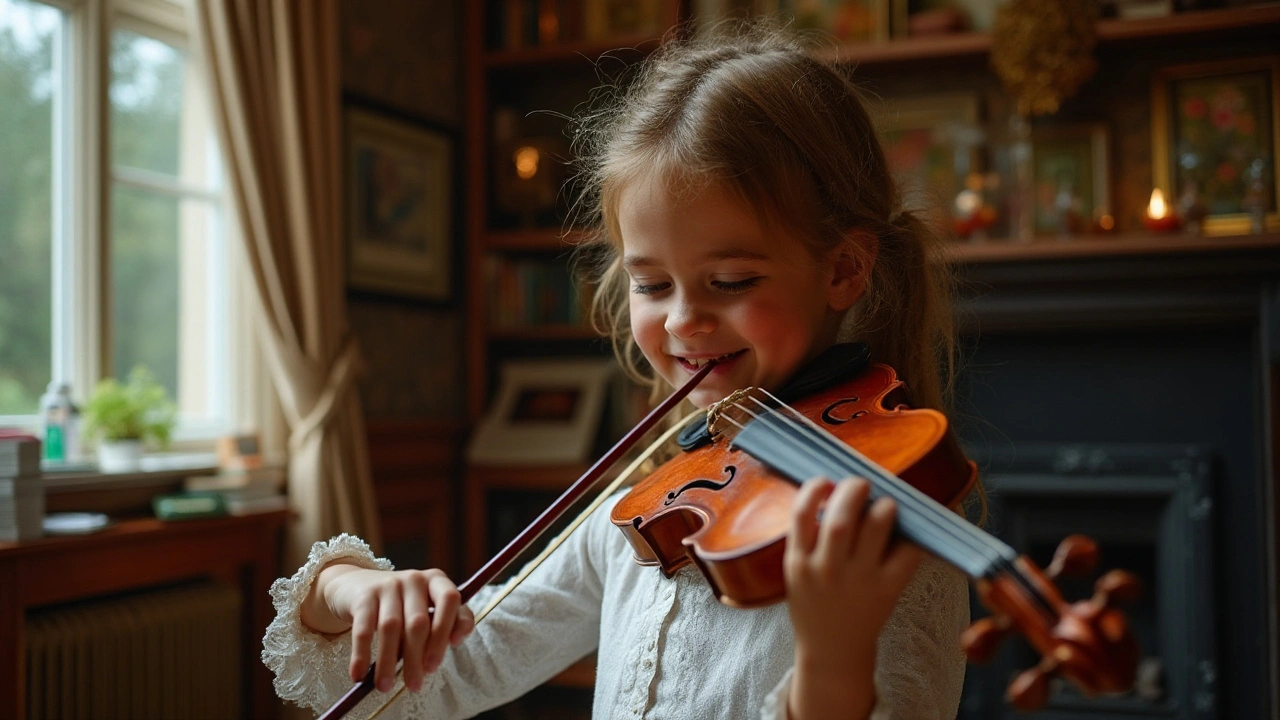
Practical Tips to Begin Your Musical Journey
Embarking on a musical journey can be both exhilarating and daunting. The key to success lies in taking the right initial steps and staying committed to your journey of musical discovery. For those eager to dive into the world of musical instruments, it begins with selecting the right instrument that fits your personality and lifestyle. Are you drawn to the versatility of a guitar, the classical appeal of a violin, or perhaps the rhythmical allure of a drum set? Consider the sound you connect with the most and how you envision playing. Ponder over the size and portability of the instrument and how it fits into your daily routine. Investing in an instrument you genuinely enjoy will sustain your interest and commitment.
Once you have decided on an instrument, the next step is to find quality resources to learn. This could be in-person lessons from a professional, online tutorials, or music classes offered by local community centers. Setting achievable goals will help keep you motivated. Start with easy songs or simple melodies that you can gradually build upon. Even dedicating just 20 minutes a day can lead to impressive progress over time. Remember, learning music is a marathon, not a sprint, and patience is a virtue that will serve you well.
Practice is the heart of improvement and creativity. Developing a consistent practice routine is crucial. Designate a quiet space in your home where you can practice without distractions. Set a regular schedule that allows you to engage with your instrument daily. Remember, consistency beats intensity. A habit of practicing every day for a short time can be more beneficial than sporadic long sessions that might lead to frustration or burnout. Take breaks when needed, as periods of rest can inspire creativity and solidify what you have learned.
Another important tip is to engage with a community of musicians. Joining a music group or a band can enhance your learning experience. It provides an opportunity to play alongside others, which can open up new musical possibilities and insight. Sharing tips and experiences with fellow enthusiasts can also boost your confidence and introduce you to new styles and techniques.
As George Frideric Handel said, "Whether you employ me at cannons and bells or flutes and strings, I am prepared and will provide a night of unforgettable music." This quote emphasizes the diverse opportunities that lie within music, waiting for you to explore them.
Remember to track your progress. Keeping a journal of what you've learned and achieved can be immensely rewarding and will highlight your growth over time. Recording yourself playing can also provide new insights and allow you to hear nuances you might miss while playing. Finally, the most important tip is to have fun and enjoy every step of the way. Music should be a joyous and cathartic experience, offering a space for personal expression and satisfaction. So pick up your instrument, let your creativity flow, and witness the magic unfold.



